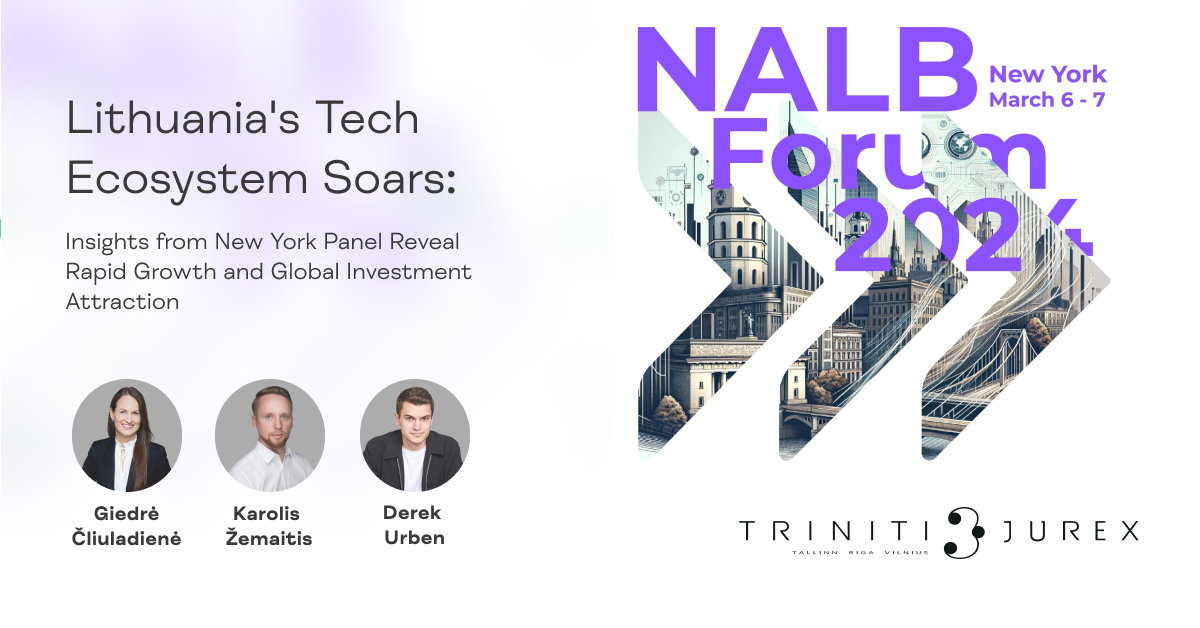
Ongoing elections are full of promises made by the candidates. It is the moment when they may be captured and compared with what is expected by the business. With the plans in place, it’s up to us to implement them and, in a few years’ time, see where we go.
In a recent panel discussion held in New York, experts delved into the evolving investment landscape, particularly focusing on Lithuania’s thriving technology sector.
Moderated by Viktoras Judickas, a partner at “Iron Wolf Capital“, with a rich background in European tech ventures and partnerships with significant entities like LinkedIn Corp, the panel included Giedrė Čiuladienė, TRINITI JUREX partner and trusted legal advisor in Lithuanian tech ecosystem; Karolis Žemaitis, the Vice-Minister of the Economy and Innovation of Lithuania; and Derek Urben, an investor at “Left Lane“ and noted writer on investment adventures.
Key insights and takeaways from the panel discussion into a quick recap
During the panel, Giedrė Čiuladienė provided a deep dive into the legal frameworks and initiatives that have propelled the Lithuanian tech ecosystem to new heights. She emphasized that 292 million euros was raised by Lithuanian startups in the span of just one year alone, and the strategic importance of legal adaptations that have facilitated this surge. Giedrė emphasized the responsive nature of the government towards fostering a conducive environment for startups through legal reforms, notably in taxation and company law.
Sharing insights into the government’s role in catalyzing the tech and innovation sectors, Vice-Minister Karolis Žemaitis described Lithuania as a “startup itself,” underlining its resilience and agility in the face of global competition. Karolis underscored the significance of government initiatives that reduce regulatory burdens and promote Lithuania on the global stage, including international accelerators and the establishment of a Lithuanian hub in Silicon Valley.
Derek Urben offered an external perspective, acknowledging the efficiency of capital markets in identifying and investing in high-potential regions like Lithuania. He noted, “Capital markets are very, very efficient. If great companies are being built somewhere, capital will find them.” Derek highlighted Lithuania’s evolution as a hub for high-quality outsourced talent and its burgeoning entrepreneurship, driven by a high density of technical talent.
During the panel, some of the challenges and opportunities were also addressed. For example, Derek expressed concern over the disconnect between old wealth and new investment opportunities in Lithuania. He emphasized the importance of domestic capital in fostering local companies and pointed to the geopolitical situation as both a challenge and a driver of resilience and innovation.
In conclusion, the panel discussion in New York shed light on Lithuania’s dynamic investment climate and its emergence as a leading tech hub in Europe. The insights from Giedrė Čiuladienė, Karolis Žemaitis, and Derek Urben paint a picture of a country that combines a rich technical heritage with forward-thinking policies and a vibrant startup ecosystem. As Lithuania continues to attract global attention and investment, it stands as a testament to the power of collaboration between the government, the legal framework, and the entrepreneurial spirit in driving technological advancement and innovation. Will the government proceed with supporting talent growth, introducing required further legal changes, attracting foreign investments as well as facilitating employment of the domestic capital?
